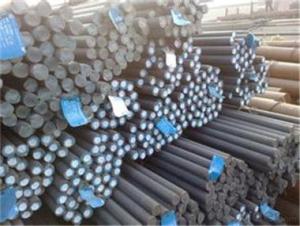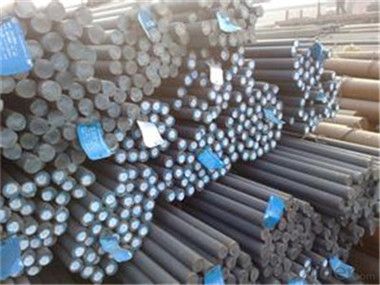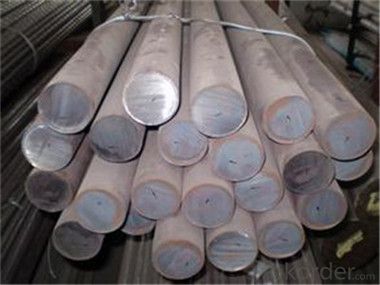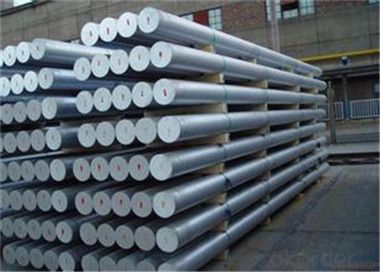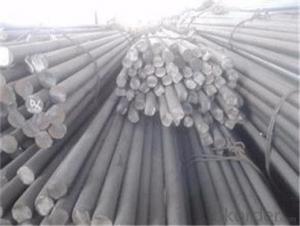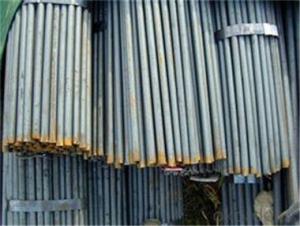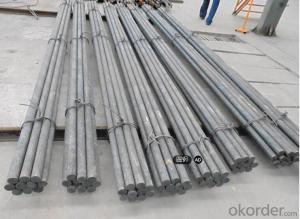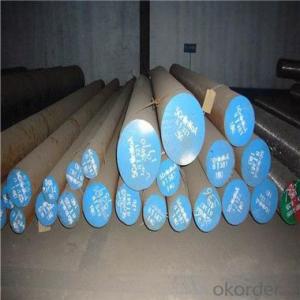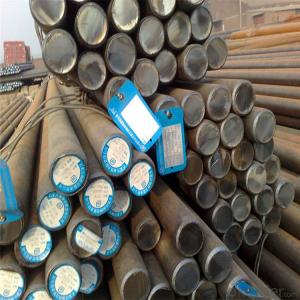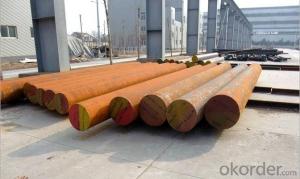C45/ CK45 / SAE1045 / 45# / En8 Forged Steel Round Bar
- Loading Port:
- Tianjin
- Payment Terms:
- TT OR LC
- Min Order Qty:
- 344 m.t.
- Supply Capability:
- 2000000 m.t./month
OKorder Service Pledge
OKorder Financial Service
You Might Also Like
Description of steel round bar:
1. Commodity: Round steel bar
3. Technical: Hot rolling
2. Length: Min. 5.8meter, according to requirement.
3. Diameter: 16mm-250mm
5. Packing: In Bundle or according to your requirements.
Festures of steel round bar:
Main products | |
Hot work tool steel | |
DIN | 1.2344,1.2343,1.2365,1.2581,1.2367,1.2714 etc. |
AISI | H13,H11,H10,H21,L6 etc. |
JIS | SKD61,SKD6,SKD5,SKT4 etc. |
Cold work too steel | |
DIN | 1.2601,1.2379,1.2080,1.2363,1.2842,1.2419,1.2510,1.2550,1.2767 etc. |
AISI | D2,D3,A2,O2,O1 etc. |
JIS | SKD1,SKD11,STD12,SKS31,SKS3 etc. |
Plastic mould steel | |
DIN | 1.2083,1.2311,1.2312,1.2316,1.2738 etc. |
AISI | P20, P20+Ni,P20+S,420 etc. |
JIS | NAK80 |
High speed tool steel | |
DIN | 1.3355,1.3343 |
AISI | T1,M2 |
JIS | SKH2,SKH51 |
Structural alloy steel | |
DIN | 1.7225,1.6511 |
AISI | 4140,4340 |
JIS | SCM440 |
We also supply customized special steel, contact us for more information ! | |
Specifications of steel round bar:
Providing complete services from manufacturing and marketing to distributing;
Steel exported all over the world;
Service like peeling,milling,grinding,cutting and heat treatment etc...
All steel must pass high quality detection;
Images of steel round bar:
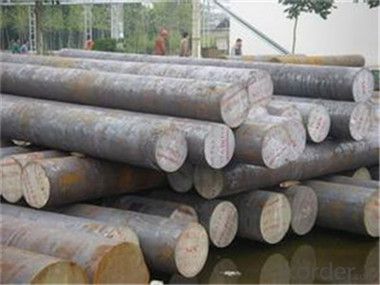
FAQ:
1. What is your package?
Packing situation: standard seaworthy packing or as customer required.
2. How long is the lead time?
Delivery time: 45 days after order confirmed.
3. What payment term do you accept?
Payment: T/T or L/C at sight.
- Q: Can steel round bars be used in the hospitality industry?
- Certainly! Steel round bars are indeed applicable in the hospitality field. Possessing versatility and durability, they are well-suited for a variety of purposes within this industry. These bars can be employed in the construction of furniture items like chairs, tables, and bar stools, as well as in the creation of decorative elements such as railings, light fixtures, and signage. Moreover, steel round bars offer exceptional strength and stability, thus ensuring the safety of both guests and staff members. Furthermore, they can be easily customized to align with the preferred aesthetic and design choices of different hospitality establishments. All in all, steel round bars prove to be a dependable and pragmatic option for the hospitality industry, thanks to their robustness, versatility, and visual appeal.
- Q: What are the different types of surface defects that can occur in steel round bars?
- There are several types of surface defects that can occur in steel round bars. Some of the most common defects include: 1. Scratches: These are shallow grooves or marks on the surface of the round bar caused by friction or contact with sharp objects during handling or transport. 2. Pitting: Pits are small, localized cavities or depressions on the surface of the round bar caused by corrosion or exposure to harsh environments. Pitting can lead to further corrosion if not addressed. 3. Scale: Scale refers to the thin layer of oxide or other impurities that can form on the surface of steel round bars during the manufacturing process. It can affect the appearance and quality of the bar but is often removed during subsequent processing or cleaning. 4. Scabs: Scabs are irregularly shaped protrusions or raised areas on the surface of the round bar caused by solidification or cooling issues during the casting process. They can reduce the strength and integrity of the bar if not properly addressed. 5. Roll marks: These are elongated depressions or ridges on the surface of the round bar caused by uneven or improper rolling during the manufacturing process. Roll marks can affect the dimensional accuracy of the bar and may require additional processing or grinding to remove. 6. Laminations: Laminations are internal defects that can sometimes be visible on the surface of the round bar. They are caused by improper bonding or separation of layers during the steelmaking process. Laminations can weaken the bar and reduce its load-bearing capacity. 7. Inclusions: Inclusions are non-metallic particles or impurities that can become trapped in the steel during the manufacturing process. They can appear as dark spots or irregularities on the surface of the round bar and may affect its mechanical properties. It is important to note that these surface defects can vary in severity and impact on the performance of the steel round bar. Manufacturers and quality control personnel employ various inspection techniques to identify and mitigate these defects to ensure the quality and reliability of the final product.
- Q: Are steel round bars suitable for use in the oil and gas industry?
- Yes, steel round bars are suitable for use in the oil and gas industry. Steel round bars are known for their strength, durability, and high resistance to corrosion, which makes them well-suited for the challenging and harsh environments encountered in the oil and gas industry. These bars are commonly used in various applications such as drilling tools, valves, pipelines, and offshore structures. The oil and gas industry involves operations in offshore rigs, refining facilities, and pipelines that are exposed to extreme temperatures, pressures, and corrosive substances. Steel round bars are capable of withstanding these conditions and maintaining their structural integrity, making them a reliable choice for critical components. Another advantage of steel round bars is their versatility. They can be easily machined, welded, and fabricated into different shapes and sizes, allowing for customization to meet specific project requirements. This flexibility is crucial in the oil and gas industry, which often demands unique and complex equipment. Furthermore, steel round bars offer excellent mechanical properties, including high tensile strength and impact resistance, which are essential for withstanding heavy loads and dynamic forces associated with oil and gas operations. Their ability to handle these loads ensures the safety and reliability of equipment and structures in the industry. In addition to their mechanical properties, steel round bars have a high resistance to corrosion, which is critical in the oil and gas industry due to the presence of corrosive substances such as hydrogen sulfide and saltwater. Corrosion resistance ensures the longevity and reliability of equipment, reducing maintenance costs and downtime. Overall, steel round bars are a suitable choice for use in the oil and gas industry due to their strength, durability, corrosion resistance, and versatility. These properties make them ideal for various applications, ensuring the safe and efficient operation of equipment and structures in this demanding industry.
- Q: Can steel round bars be coated with protective finishes?
- Steel round bars can indeed have protective finishes applied to them. Applying protective finishes to steel round bars is a widespread practice aimed at improving their durability and resistance to corrosion. There are several options available for protective finishes, such as galvanizing, powder coating, and epoxy coating, among others. These finishes effectively safeguard the steel bars against rust and deterioration, thus prolonging their lifespan and enabling them to perform well in different environments. The selection of a protective finish depends on various factors, including the intended use of the steel round bars, the extent of exposure to moisture or corrosive substances, and the desired aesthetic appeal.
- Q: What are the different types of steel round bar coatings used in the marine industry?
- In the marine industry, various coatings are commonly used to protect steel round bars from corrosion and other environmental factors. These coatings have been specifically designed to withstand the harsh conditions found in marine environments. The most frequently utilized types of coatings in this industry include the following: 1. Galvanized Coating: A layer of zinc is applied to galvanized steel round bars, offering excellent corrosion protection and durability. This coating is ideal for marine applications where the steel is exposed to corrosive elements such as saltwater. 2. Epoxy Coating: Due to their exceptional resistance to corrosion and strong adhesion properties, epoxy coatings are widely employed in the marine industry. Multiple layers of epoxy are typically applied to ensure optimal protection against saltwater, chemicals, and abrasion. 3. Polyurethane Coating: Polyurethane coatings are highly regarded for their exceptional resistance to UV rays, chemicals, and abrasion. These coatings provide a high level of corrosion protection in marine environments, making them ideal for offshore structures and marine equipment that require long-term durability. 4. Organic Coatings: Acrylics and vinyls are commonly used in the marine industry as organic coatings, offering a protective barrier against corrosion and environmental factors. These coatings are known for their flexibility, ease of application, and resistance to UV radiation. They are often utilized in marine applications where aesthetics and color retention are important. 5. Ceramic Coating: Ceramic coatings are particularly resistant to high temperatures, chemicals, and abrasion. They form a hard, protective layer on steel round bars, making them suitable for marine applications that involve extreme heat and harsh environments. When selecting the appropriate steel round bar coating for a marine project, it is essential to consider the specific requirements of the application. Factors such as the type of exposure, expected service life, and budget should be taken into account to determine the most suitable coating.
- Q: Can steel round bars be bent?
- Yes, steel round bars can be bent. The flexibility of steel allows it to be shaped and manipulated into various forms, including bending round bars into desired angles or curves.
- Q: Can steel round bars be used for decorative purposes?
- Yes, steel round bars can be used for decorative purposes. They can be shaped, polished, and designed in various patterns to enhance the aesthetic appeal of architectural elements, furniture, sculptures, and other decorative objects. The versatility and durability of steel make it a popular choice for both functional and decorative applications.
- Q: How do steel round bars compare to stainless steel round bars?
- Steel round bars and stainless steel round bars differ in terms of their composition and properties. Steel round bars are made of carbon steel, which contains varying amounts of carbon and other alloys. They are generally more affordable and widely available, but may be susceptible to corrosion. On the other hand, stainless steel round bars are made of an alloy that contains a higher percentage of chromium. This addition of chromium enhances the corrosion resistance of stainless steel, making it suitable for applications in environments with high moisture or exposure to chemicals. Although stainless steel round bars may be more expensive, they offer superior durability and a polished appearance. Overall, the choice between steel and stainless steel round bars depends on the specific requirements of the application, such as strength, corrosion resistance, and cost-effectiveness.
- Q: The difference between galvanized round bar and galvanized flat steel
- Galvanized round bar and galvanized flat steel are of different shapes and different uses.
- Q: Why is the round bar bent?
- In fact, the stress and deformation complex around reinforced concrete, bond stress varies with grip length of the rebar so bond strength with steel type, shape and position of the embedded in concrete, different direction and change, is also related to concrete strength, concrete compressive strength the higher the strength, the bond strength is generally determined by R=P/3.14dL. P for pullout force, D, rebar diameter, L, steel embedment length.
Send your message to us
C45/ CK45 / SAE1045 / 45# / En8 Forged Steel Round Bar
- Loading Port:
- Tianjin
- Payment Terms:
- TT OR LC
- Min Order Qty:
- 344 m.t.
- Supply Capability:
- 2000000 m.t./month
OKorder Service Pledge
OKorder Financial Service
Similar products
Hot products
Hot Searches
Related keywords
